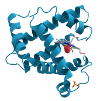Overview
In the last three decades, many computer scientists in Artificial Intelligence have made significant contributions to modeling biological systems as a means of understanding the molecular basis of mechanisms in the healthy and diseased cell. The field of computational biology includes the development and application of data-analytical and theoretical methods, mathematical modeling and computational simulation techniques to the study of biological, behavioral, and social systems. The focus of this workshop is the use of nature-inspired approaches to central problems in computational biology and bioinformatics, including optimization methods under the umbrella of evolutionary computation.
In recent years, significant progress has been made in the development of novel and powerful algorithms to solve outstanding structure-centric problems at the heart of molecular biology, such as structure modeling, prediction, and analysis, molecular optimization and design, characterization of supramolecular complexes, structure-driven prediction of variant effects on stability, function, and dysfunction, and more. These problems often pose difficult search and optimization tasks on modular systems with vast, high-dimensional, continuous search spaces often underlined by non-linear multimodal energy surfaces. One of the main objectives of this workshop is bring together researchers from different communities and disciplines to exchange the latest knowledge and expertise on computational treatments of small and large molecules for structure-centric problems in molecular biology. The workshop will allow for a broader focus on structure-related problems that necessitate the design of novel evolutionary computation approaches. A particular focus will be on connecting this body of research with latest developments in deep learning to spur the design of novel frameworks, as well as to overcoming prediction problems present in recent successful deep learning architectures (e.g., RoseTTAFold and DeepMind's AlphaFold2 that are capturing the attention of the worldwide research community). Following the previous editions in GECCO 2015, GECCO 2016 and GECCO 2017 (the first two editions focused on computational structural biology), one of the objectives of this workshop is to aid evolutionary computation researchers to disseminate recent findings and progress. In this edition, we expand this objective to connect the deep learning community with the evolutionary computation community, as well as broaden our focus beyond protein-centric problems to include a larger community of researchers making rapid advances in small molecule optimization and design for novel therapeutics and biotechnology applications. The workshop will provide a meeting point for authors and attendants of the GECCO conference who have a current or developing interest in computational biology and bioinformatics. We believe that the workshop will also attract researchers working at the intersection of deep learning and bioinformatics to join the GECCO attendance and community and spur novel collaborations. We hope this workshop will stimulate the free exchange and discussion of novel ideas and results and further advance scientific enquiry and progress.Areas of interest include (but are not restricted to):
• Genome and sequence analysis with nature-inspired approaches.
• Biological network modeling and analysis.
• Use of artificial life models such as cellular automata or Lindenmayer systems in the modeling of biological problems.
• Study and analysis of properties of biological systems like self-organization, self-assembled systems, emergent behavior or morphogenesis.
• Hybrid approaches and memetic algorithms in the modeling of computational biology problems.
• Multi-objective approaches in the modeling of computational biology problems.
• Use of natural and evolutionary computation algorithms in protein structure classification and prediction (secondary and tertiary).
• Mapping of protein and peptide energy landscapes.
• Integration of evolutionary computation algorithms with deep-learning architectures.
• Mapping of protein and peptide energy landscapes.
• Modeling of temporal folding of proteins.
• Molecular optimization and design.
• Binding, docking, and complexation.
• Prediction of variant effects on stability, function, and dysfunction.
• Evolutionary search strategies to assist cryo-electron microscopy and other experimental techniques in model building.
• Surrogate models and stochastic approximations of computationally expensive fitness functions of biomolecular systems.
